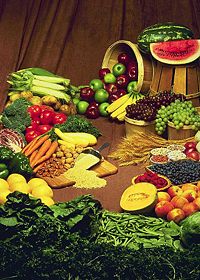- Natural foods
-
"Natural foods" and "all natural foods" are widely used terms in food labeling and marketing with a variety of definitions, some of which are vague. The term is assumed to imply foods that are minimally processed and do not contain manufactured ingredients, but the lack of standards in some jurisdictions means that the term assures nothing. The term "organic" has similar implications and has an established legal definition in many countries and an international standard. In some places, the term "natural" is defined and enforced. In others, such as the United States, it has no meaning.
Contents
Formal definitions, or lack thereof
"Natural foods" are often assumed to be foods that are minimally processed and do not contain any hormones, antibiotics, sweeteners, food colors, or flavorings that were not originally in the food.[1] The terms are often misused on labels and in advertisements.[2]
The international Food and Agriculture Organization's Codex Alimentarius does not recognize the term "natural" but does have a standard for organic foods.[3]
Fundamentally, almost all foodstuffs are derived from the natural products of plants and animals and therefore any definition of natural food results in an arbitrary exclusion or inclusion of food ingredients; likewise, since almost all foods are processed in some way, either mechanically, chemically, or by temperature, it is difficult to define which types of food processing is natural.[4]
Definition by process and by product
United Kingdom
UK blue Smarties, old and new. Blue Smarties were re-introduced by Nestlé in the UK in February 2008, using a "natural" blue dye derived from the cyanobacterium spirulina rather than synthetic blue dye.[5]
In the United Kingdom, the Food Standards Agency published criteria for the use of several terms in food labeling. The guidance, in general, restricts the use of natural to foods that have "ingredients produced by nature, not the work of man or interfered with by man." Natural flavorings are explicitly defined by separate laws.[6]
There are different standards for various types of food, such as dairy products. It also gives standards for some food processing techniques, such as fermentation or pasteurization. The standard explicitly rules out "foods derived from novel processes, GM or cloning."[7]
Definition by process only
Canada
The Canadian Food Inspection Agency restricts the use of "natural" to foods that have not been significantly altered by processing and gives examples of processes that do or do not significantly alter food. This includes two specific additional requirements:[8]
- A natural food or ingredient of a food is not expected to contain, or to ever have contained, an added vitamin, mineral nutrient, artificial flavouring agent or food additive.
- A natural food or ingredient of a food does not have any constituent or fraction thereof removed or significantly changed, except the removal of water.
Israel
In Israel, natural ingredients are defined as part of the Labelling of Prepacked Food Standard (Israeli Standard SI 1145, which is legally binding).
The standard offers a list of 33 processes which are allowed in natural ingredients, all of which are physical treatments and not chemical modifications. These include blending, cleaning, extrusion, freezing, drying, etc.
A specific ingredient can be called "natural" if it didn't go through any processing except for the listed ones. The whole food can be called "natural" if the food is not a blend of foods (even if they are all natural), has no added ingredients, and underwent only the specified processes.[9]
No definition
United States
In the United States, neither the Food and Drug Administration (FDA) nor the U.S. Department of Agriculture (USDA) has rules for “natural." The FDA explicitly discourages the food industry from using the term.[10] The Food, Drug, and Cosmetic Act prohibits labeling that is false or misleading, but does not give any specifics. The USDA's Agricultural Marketing Service has a standard for organic food.[11]
Because there is no legal meaning for natural foods, food manufacturers can include ingredients that may not be considered natural by some consumers.
The poultry industry has been criticized by the Center for Science in the Public Interest for labeling chicken meat "all natural" after it has been injected with saline solution up to 25% of its weight, but there is no legal recourse to prevent this labeling.[12]
Although there is no legal U.S. definition for natural foods, there are numerous unofficial or informal definitions, none of which is applied uniformly to foods labeled "natural".
See also
- Organic certification
- Raw food diet
- Whole foods
- Health food
References
- ^ Ikerd, John. The New American Food Economy.
- ^ "Guide to Food Labeling and Advertising, Chapter 4". Canadian Food Inspection Agency. http://www.inspection.gc.ca/english/fssa/labeti/guide/ch4ae.shtml.
- ^ "List of standards". Food and Agriculture Organization. http://www.codexalimentarius.net/web/standard_list.do?lang=en.
- ^ Food processing: a century of change, R. W. Welch and P. C. Mitchell (2000) British Medical Bulletin, 56 (No 1) 1-17, http://bmb.oxfordjournals.org/cgi/reprint/56/1/1-a.pdf
- ^ "UK | Seaweed allows Smarties comeback". BBC News. 2008-02-11. http://news.bbc.co.uk/1/hi/uk/7238247.stm. Retrieved 2009-07-22.
- ^ "Criteria for use of the terms Fresh, Pure, Natural Etc. in food labeling". Food Standards Agency. http://www.food.gov.uk/multimedia/pdfs/markcritguidance.pdf.
- ^ "Criteria for use of the terms Fresh, Pure, Natural Etc. in food labeling". Food Standards Agency. p. 16. http://www.food.gov.uk/multimedia/pdfs/markcritguidance.pdf.
- ^ "Guide to Food Labeling and Advertising, Chapter 4". Canadian Food Inspection Agency. http://www.inspection.gc.ca/english/fssa/labeti/guide/ch4ae.shtml.
- ^ "Food and Agricultural Import Regulations and Standards". US Department of Agriculture. http://gain.fas.usda.gov/Recent%20GAIN%20Publications/Food%20and%20Agricultural%20Import%20Regulations%20and%20Standards%20-%20Narrative_Tel%20Aviv_Israel_7-26-2010.pdf.
- ^ IS THERE A DEFINITION FOR NATURAL FOODS?, Institute of Food Technologists, http://www.am-fe.ift.org/cms/?pid=1000744
- ^ "National Organic Program". AMS. http://www.ams.usda.gov/AMSv1.0/nop.
- ^ Groups say many chickens not as 'all natural' as advertised, seek labeling changes, Los Angeles Times, February 24, 2010, http://www.latimes.com/business/nationworld/wire/sns-ap-us-poultry-labeling,0,1637832.story
Categories:- Diets
- Food and drink
Wikimedia Foundation. 2010.


